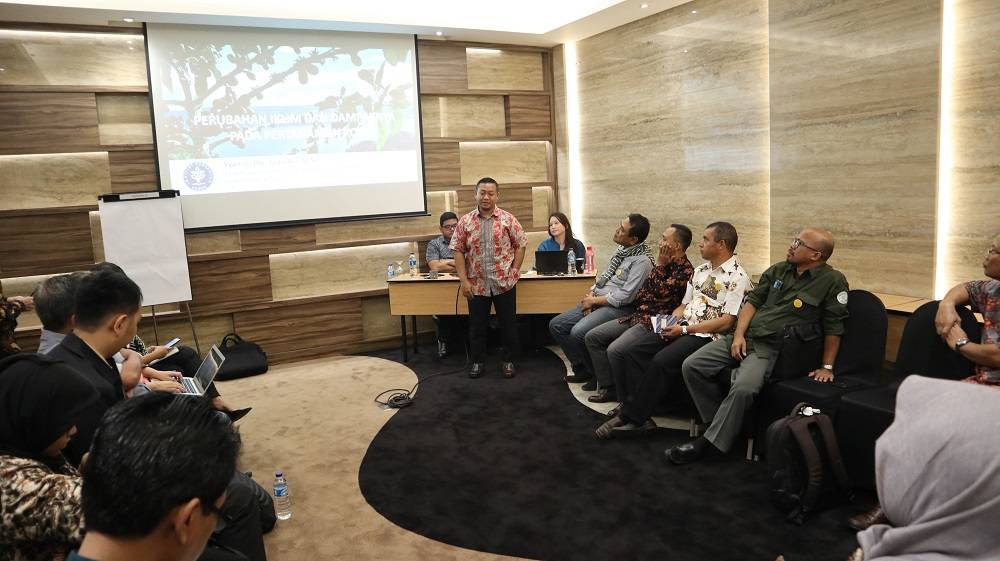Detail Activity

Activity Description
Jakarta (Indonesia), 31 August 2019 – DISKO (Diskusi Kopi) is one of the Secretariat’s routine bi-monthly informal discussion for SCOPI Members and Partners to exchanges ideas to be implemented as program or activity. This discussion on Climate Change aims to follow up on the action plans that were raised during the previously held discussion, namely: 1) to educate or train the farmers on issues of climate change impacts; 2) replicate the previously done research by CCROM in North Sumatra in other regions to get an overview information on the impacts of climate change; and 3) to explore the need to study the impacts of climate change on all actors and supply chains in the coffee industry.
SCOPI collaborated with its Member, Rikolto as a co-organiser and held the event at the Jakarta Coffee Week on 30 August – 1 September 2019, this discussion was opened to the general public. The discussion received enthusiastic reception from those involved in coffee sector who are interested and contributed their inputs on the issues of climate change. We welcome the participation of farmers as well as our Members such as BITRA, Indocafco, and other institution namely Lutheran World Relief and Yayasan Kehati, assisting the Secretariat as as moderator is Ms. Leony Aurora (SCOPI Advisory Board).
The session was opened with sharing experiences by the farmers on the direct impact of climate change such as the irregularity of season patterns that causes prolonged drought or excessive rain. Both have a negative impact on coffee plants. Prolonged drought causes the dead of shading tress and pests such as ants attacking the coffee cherries. Excessive rain causes the flowers to fall causing the declining of production. Another impact is the increasing of temprature that cause the declining of biological control in certain pests. Temprature raise at a certain altitude, an increament of 1-2 degrees celcius provided coffee berry borer an ideal environment to reproduce at an altitue of 800 to more than 1000mdpl and attack the robusta coffee. These factors directly affect the yields productivity both in terms of quantity and quality of the coffee.
Participants were divided into three discussions groups to fine tune the proposed action plans from the previous workshops that are expected to be strategic plan for SCOPI for the next 1-2 years.
The workshop provided the following recommendation/action plan on the subject of education or training to farmers on the issues of climate change impacts:
Integrating climate change issue to the National Curriculum modul.
To include climate change to the Training of Trainers (TOT) for the Master Trainers.
To monitor the Master Trainers in conducting their training to the farmers on the subject of climate change.
To conduct a cross learning/knowlegde sharing from SCOPI Members or Partners with prior research result to interested party to foster collaboration.
To involve SCOPI Members to initiate awareness campaign to the farmers with various communication media such as brochure and leaflet.
The workshop provided the following recommendation/action plan on the subject of the needs to conduct research in other are of Indonesia to assess the impact of climate change:
To conduct literatur review on the impact of climate change to coffee
To map out climate change adaptation strategy, including identifying resilience coffee variety and shading tree on climate change
To conduct case study in collaboration with prominent university in Indonesia namely IPB (Agriculture Institute of Bogor), USU (North Sumatra University), and SCOPI Members whose results can be included as best practice reference in the National Curriculum modul and to become one of adaptation strategy on climate change
The workshop provided the following recommendation/action plan on subject of assessing the impact of climate on all actors and supply chains in the coffee industry:
To conduct study to assess the impact of climate change systematically and structurally and to measure the carbon footprint from all the actors in coffee industry.
To conduct study on varieties that are reslience to withstand the impact of climate change
To initiate campaigned in raising awareness for general public/consumer and farmers in reducing carbon footprint and promote eco-friendly attitute. The campaign can be done with multiple stakeholders in coffee industry such as e-commerce, community, non-profit organisation, SCOPI Members, local government, and or influencer.
All of these recommendations will be followed up by the Secretariat by conducting in-depth discussions with the Members to explore the possibilities and choosing the priorities, and to idientify which actors to take on the role as lead facilitator.
SCOPI offers its Members an opportunity to take on leadership role and to propose plan as a concrete and positive action in an effort to tackle and mitigate issues on climate change.
